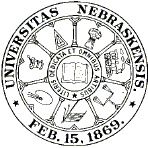
University Studies (University of Nebraska) (1888–1984)
Date of this Version
4-1917
Citation
UNIVERSITY STUDIES VOL. XVII, April-July 1917, Nos. 2, 3. 204 pp.
Abstract
The calling of the estates-general for 1789 marked the culmination of a long and bitter struggle between the king and the privileged orders, caused chiefly by the financial embarrassment of the country. The victory over the king was the signal for.a still more bitter conflict between the third estate and the privileged classes over the organization of the estates-general. It was continued after the formal opening of the estates in May, 1789, under the guise of a new contest, over the manner of verifi€ation of credentials. Although outwardly but a matter of parliamentary procedure, this question in reality veiled that other most important question of whether there should be a single assembly with majority rule, upon which the third estate insisted, or an adherence to the ancient custom of three assemblies with vote by order. Consequently the decision on credentials. would imply the settlement of the other question which was the real cause of strife. Conferences due to the initiative of the clergy failed to break the deadlock; nor did the renewal of the conferences, under the direction of the government, bring more satisfactory results. At last, after more than a month of dissension, this struggle of the orders, which had at bottom the further question of how France should be reformed, was resolved by the assumption of supremacy on the part of the third estate, when, on June 17, it declared itself a national assembly. As the consequence of this decisive step, which in a sense marked the end of the first phase of the early revolution-the strife of the orders--the government, through Necker, began the formulation of a plan for a second interference by which it hoped to compromise with the deputies of the commons and to prevent all power from passing into their hands. However, before the execution of the project-delayed by the opposition of the reactionary court to Necker--could be effected, the government itself had forced on the very thing that the plan was to avert. On June 19, the same day on which Necker's plan for a royal session was considered for the first time in the council of ministers, the clergy closed their discussion of verification of credentials and put the matter to a vote. The vote resulted in a very small plurality for verification by order because the majority of the deputies had divided their votes among three other propositions, all of which, however, favored verification in common. After what appears to have been the closing of the session,! this majority remained in the hall and held a meeting with the Archbishop of Vienne as the presiding officer. The result of two hours of deliberation was the unanimous agreement of the one hundred forty-one members present to the following decree: "The plurality of the members of the clergy assembled have been of the opinion that the definitive verification of credentials should be done in the general assembly, under the reservation of the distinction of orders and other reservations of right." Those present signed the decree and eight absent members added their names later, making a total of one hundred fortynine in favor of common verification. This action of the majority created consternation among the adherents of verification by separate assemblies. The union was to occur the next day. Not only would it be a severe blow to the order of the clergy, but it would render more precarious the already difficult position of the government. So the minority of the clergy sought the assistance of the king and ministry. During the night of June 19, the Cardinal de la Rochefoucauld and the Archbishop of Paris made a hurried trip to Marly to beg the king to prevent the ruin of, the order of the clergy. In view of this plea and of their own perception of the danger to the authority of the government, if the prospective union were to occur, the ministry decided to suspend the sessions of all the orders until June 22, under the pretext of preparations for the royal session, announced for that date.

